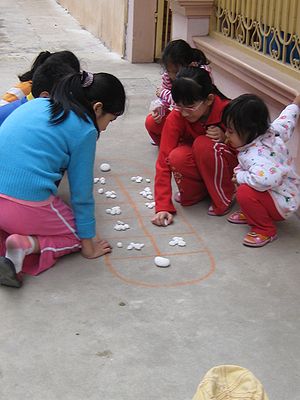- List of mancala games
-
Games in the mancala family include:
Contents
Popular games
The most widely played games are probably:
- Bao is a complex strategy game of Kenya and Zanzibar, played on an 8×4 board.
- Kalah is the ruleset usually included with commercially available boards; however, the game is heavily biased towards the first player, and it is often considered a children's game. The board is 2×6 with stores.
- Oware, the national game of Ghana, is also known by Warri,[1] Ayo (Yoruba Name. Nigeria), Awele, Awari, Ouril, and other names. It has relatively simple rules but considerable strategic depth. The board is 2×6 with stores.
- Omweso (also known as coro) is a strategic game of Uganda, played on an 8×4 board.
- Pallanguzhi is played in Southern India with 2 x 7 stores. Two varieties of this game are popular, Kaashi and Bank.
Games with unusual features
- Bohnenspiel is a German mancala based on a Persian game not unlike some African mancala variants. The board is 2×6 with stones.
- Eson xorgol, a game played by the Kazakh minority in western Mongolia, is traditionally played with goat feces. The board is 2×5.
- //Hus is a Namibian game. The board is 4×8.
Non-traditional games
- Conga (Martin Franke; Germany)
- Cups (Arthur Amberstone and Wald Amberstone; United States: New York)
- The Glass Bead Game (Christian Freeling) is a complex mancala-style game with different colored stones.[2]
- Oh-Wah-Ree is a commercial variant of oware with provision for more than two players.
- 55Stones is a modern mancala game with simultaneous moves.
- Kauri is a modern mancala game with two kinds of seeds.
Traditional games
- Abangah (the Azande of Sudan) The board is 2×8 with stores.
- Agsinnoninka (Philippines)
- Al-manqala (Palestine)
- Ali Guli Mane (India— Karnataka)
- Anywoli (Ethiopia, Sudan)
- Aw-li On-nam Ot-tjin (Borneo)
- Aweet (Sudan, Namibia)
- Ba-awa (Ghana) The board is 2×6 with stores.
- Bajangkaq (Sumatra)
- Baqura (Mesopotamia)
- Bay Khom (Cambodia)
- Bau (the Wa Chaga)
- Beatta (Tayma)
- Bohnenspiel (Germany)
- Chanka (India, Sri Lanka)
- Chisolo (Zambia)
- Chonka (Borneo)
- Chongka, or Tchonka (Marianas)
- Choro
- Chuncajon (Philippines)[3]
- Congkak (Indonesia, Malaysia) The board is 2×7 with stores.
- Coro (Ugando)
- Dakon (Java island of Indonesia)
- Dara-dara (Indonesia— Sulawesi)
- Daramutu (Sri Lanka)
- Ellaewala-kanda (Sri Lanka)
- En Gehé (Maasai of Tanzania)
- Gabata (Ethiopia)
- Galatjang (Sulawesi)
- Halusa (Mesopotamia)
- Hawalis (Oman)
- Igisoro (Rwanda - Burundi)
- Ingilith (the Turkana of Kenya)
- Isafu
- Isafuba
- J'erin (Nigeria)
- Kale (Gabon)
- Kaloleh (Sumatra)
- Kapo (Senegal)
- Kanji guti (India— Orissa)
- Kiela (Angola)
- Khutka boia (India— Punjab)
- Kotu-baendum (Sri Lanka)
- Kombe (Kenya)
- Kubuguza[4]
- La'b Madjnuni (Syria)
- La'b Hakimi, or La'b Akila (Syria)
- La'b Roseya (Syria)
- Li'b al-ghashim
- Longbeu-a-cha (India— Assam)
- Lontu-Holo (the Maroon of Suriname)
- Madji (the Benni of Nigeria)
- Mak Khom (Thailand)
- Mancala'h) (Egypt, Syria)
- Mandoli (Greece— Hydra)
- Mangala (Egypt, Turkey - different rules)
- Matoe (Indonesia— Sumba)
- Mawkar katiya (India— Assam)
- Mbau (Kenya— Kilimanjaro region of the Rift Valley)
- Mechiwa (Bali)
- Mefuvha[5]
- Melegayası (Turkey) The board is 2×9 with stores.
- Mereköçtü (Azerbaycan) The board is 2×9 with stores.
- Meuchoh (Sumatra-Aceh)
- Meulieh (Sumatra-Aceh)
- Meusueb (Sumatra-Aceh)
- Meuta' (Sumatra- Aceh)
- Minkale (Bin Kale) (Turkey)
- Mongale (Kenya)
- Mongola (Congo,[disambiguation needed
 ] Rwanda)
] Rwanda) - Naranj (Maldives)
- Nsolo (Zambia)
- Ô ăn quan (Viet Nam) game is 2 mandarin boxes x5 ponds each, with 25 stones or tamarind seeds each
- Obridjie (Nigeria)
- Ouril (Cape Verde)
- Pachgarhwa (India)
- Vaamana Guntalu (Telugu name, India - Andhra Pradesh)
- Pallanguzhi (Tamil of India), also known as Pallankuli.
- Pereauni (Uganda)
- Poo (Liberia)
- Puhulmuti (Sri Lanka)
- Sai (Flores)
- Sat-gol (India)
- Songo[6]
- Sungka (Philippines)
- Til-guti (India)
- Toee (Sudan)
- Toguz korgool (Kyrgyzstan) The board is 2×9 with stores.
- Toguz Kumalak (Kazakhstan); same as Toguz korgool
- Vai Lung Thlan (the Mizo in Mizoram, India)
- Walak-pussa (Sri Lanka)
- Warra (United States)
- Wa-wee (Santa Lucia)
References
- ^ Henry R. Muller, Warri: A West African Game of Skill, The Journal of American Folklore. Vol. 43, No. 169. pp. 313-316.
- ^ Glass Bead Game Introduction.
- ^ Stewart Culin, Philippine Games, American Anthropologist, Vol. 2, No. 4. (Oct-Dec 1900), pp. 643-656.
- ^ Alan P. Merriam, The Game of Kubuguza Among the Abatutsi of North-East Ruanda. Man, Vol. 53. (November 1953), pp. 169-172.
- ^ H. A. Stayt, The Bavenda.
- ^ P. H. G. Powell-Cotton, H. J. Braunholtz, A Mancala Board Called "Songo.", Man. Vol. 31. (July 1931), pp. 123.
- 7. HJR Murray, History of Board Games other than Chess (1952)
- 8. Laurence Russ, Mancala games (1984)
- 9. H. J. Braunholtz, The Game of Mweso in Uganda., Man. Vol. 31. (July 1931), pp. 121-122.
External links
Categories:- Lists of games
- Mancala
- Traditional board games
Wikimedia Foundation. 2010.

